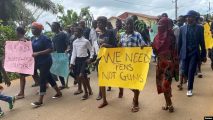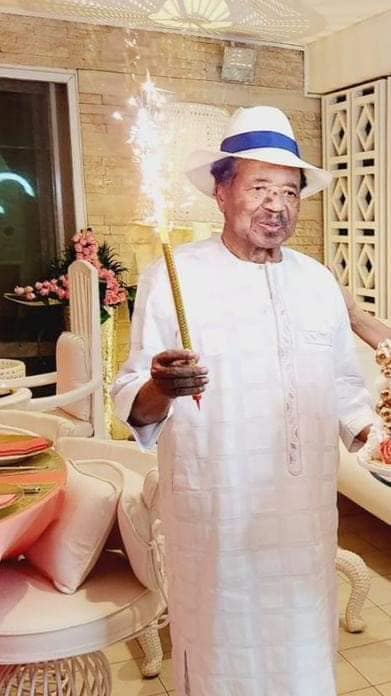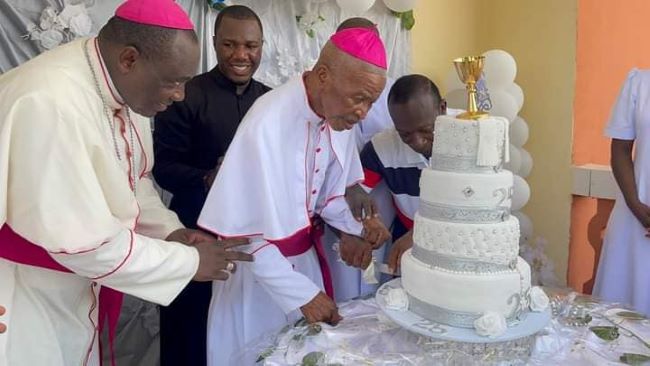Categories
Recent Posts
- Gaza Crisis: President Biden to host Jordan king next week
- Immigrating to Canada from Cameroon: All you need is to deliver an Anthony Joshua knockout blow
- Diocese of Buea: Bishop Bibi recognizes pastoral agents’ “hard work, sacrifices”
- BEAC sets two-week deadline to withdraw CFA150bn from banks in inflation battle
- Yaounde: Dion Ngute discusses upcoming S.Korea-Africa summit with visiting Minister Kang
Archives
- May 2024
- April 2024
- March 2024
- February 2024
- January 2024
- December 2023
- November 2023
- October 2023
- September 2023
- August 2023
- July 2023
- June 2023
- May 2023
- April 2023
- March 2023
- February 2023
- January 2023
- December 2022
- November 2022
- October 2022
- September 2022
- August 2022
- July 2022
- June 2022
- May 2022
- April 2022
- March 2022
- February 2022
- January 2022
- December 2021
- November 2021
- October 2021
- September 2021
- August 2021
- July 2021
- June 2021
- May 2021
- April 2021
- March 2021
- February 2021
- January 2021
- December 2020
- November 2020
- October 2020
- September 2020
- August 2020
- July 2020
- June 2020
- May 2020
- April 2020
- March 2020
- February 2020
- January 2020
- December 2019
- November 2019
- October 2019
- September 2019
- August 2019
- July 2019
- June 2019
- May 2019
- April 2019
- March 2019
- February 2019
- January 2019
- December 2018
- November 2018
- October 2018
- September 2018
- August 2018
- July 2018
- June 2018
- May 2018
- April 2018
- March 2018
- February 2018
- January 2018
- December 2017
- November 2017
- October 2017
- September 2017
- August 2017
- July 2017
- June 2017
- May 2017
- April 2017
- March 2017
- February 2017
- January 2017
- December 2016
- November 2016
- October 2016
- September 2016
- August 2016
- July 2016
- June 2016
Featured
Most Commented Posts
 4 Anglophone detainees killed in Yaounde
4 Anglophone detainees killed in Yaounde
19 comments Chantal Biya says she will return to Cameroon if General Ivo Yenwo, Martin Belinga Eboutou and Ferdinand Ngoh Ngoh are sacked
Chantal Biya says she will return to Cameroon if General Ivo Yenwo, Martin Belinga Eboutou and Ferdinand Ngoh Ngoh are sacked
13 comments Anglophone Nationalism: Barrister Eyambe says “hidden plans are at work”
Anglophone Nationalism: Barrister Eyambe says “hidden plans are at work”
12 comments The Anglophone Problem – When Facts don’t Lie
The Anglophone Problem – When Facts don’t Lie
12 comments Largest wave of arrest by BIR in Bamenda
Largest wave of arrest by BIR in Bamenda
10 comments
Latest Tweets
Featured
-

Gaza Crisis: President Biden to host Jordan king next week
-

Immigrating to Canada from Cameroon: All you need is to deliver an Anthony Joshua knockout blow
-

Diocese of Buea: Bishop Bibi recognizes pastoral agents’ “hard work, sacrifices”
-

BEAC sets two-week deadline to withdraw CFA150bn from banks in inflation battle
-

Yaounde: Dion Ngute discusses upcoming S.Korea-Africa summit with visiting Minister Kang
-

Tens of thousands of trained teachers, doctors and nurses have fled Cameroon
-

US: Trump fined $9,000 for repeatedly violating gag order in hush money trial
© Cameroon Concord News 2024





11, August 2022
Revealed: How Francophone soldiers are destroying Southern Cameroons 0
On April 24, BIR soldiers detained and severely beat between 30 and 40 motorbike riders who were part of a funeral convoy heading to Oku from Ndop, suspecting the motorcycle riders of being separatist fighters. The soldiers took them to their base in Ndop and divided them into two groups. Twenty-three were transferred to the BIR base in Bafut, about 44 kilometers from Ndop, where they were held for approximately three weeks incommunicado.
Then, they were moved to two gendarmerie stations in Bamenda, where they were held for another five days. On May 21, all 23 were transferred to Bamenda’s central prison, where they remain. They have been taken before the Bamenda’s military court at least twice since May but are yet to be formally charged, and their trial has not started.
The situation or whereabouts of the approximately 7 to 17 men other detained on April 24 in Ndop has not been revealed and they are presumed forcibly disappeared, as they were last seen in military custody in April.
Human Rights Watch spoke to two motorbike riders who were at the Ndop BIR base on April 24, to five relatives of three motorbike riders currently held at Bamenda’s central prison, and to a relative of one of those missing.
A 22-year-old bike rider who had been at the base said:
“The BIR stopped us in the middle of the road. They selected those whom they suspected to be amba fighters [separatist fighters]. Some were chosen because they had dreadlocks, others because the BIR said they had their pictures on file and they knew they were amba boys [separatist fighters]. The soldiers started beating them with a hammer, kicking them with their boots. After more than four hours like this, the BIR took them to their base, in Ndop. As a president of the motorbike riders’ union, I followed them there. I wanted to speak with the BIR commander to negotiate their release. I wanted to tell him that these people were not amba fighters, but ordinary men. Instead, the soldiers beat me and kicked me.”
A female student whose 20-year-old brother is among those in Bamenda central prison said:
“As soon as I was informed that my brother had been arrested, I started looking for him. I went to all police and gendarmerie stations in Bamenda, but I couldn’t find him. I was very worried. For about 10 days, I had no news about him. I thought he had been killed. Then, someone told me that he was detained at Bafut BIR camp. So, I went there, but the soldiers refused me access. They did not confirm he was held there but said that I should wait in Bamenda because “they will be taken there”.
The uncle of a 22-year-old man who is among the disappeared said:
My nephew is missing. We don’t know where he is now. The last time he was seen was at BIR base in Ndop. That’s what other motorbike riders told me. I went to the Bafut BIR base, but the soldiers told me he wasn’t there. Rumors circulated that he was held at the gendarmerie station in Kumbo. So, I went there, but I didn’t find him. I searched for him in Bamenda, at multiple police, and gendarmerie stations, no avail. I am very worried. I hope we find him alive.
Abusive Military Operation in Belo
Five witnesses described a three-day army operation in and around the town of Belo from June 9 to 11, during which the security forces summarily killed 47-year-old Ndifoin Clement, known as Bo Luh, injured a 33-year-old man, burned at least 12 homes, destroyed a community health center, and looted at least 10 shops.
The Killing of Bo Luh
A 29-year-old woman who lives in Belo’s Njinkfuin neighborhood described what happened when soldiers killed Bo Luh and burned his home on June 10:
The soldiers came in the morning, shooting. I saw them going toward Bo Luh’s home. I hid in the house and watched. I saw smoke and flames coming out from that house. They [the soldiers] burned it. When they [the soldiers] left, I went there and found Bo Luh’s body on the ground. He had been shot in the back. I ran away and waited until about 4 p.m. Meantime, Bo Lu’s body had been taken to his family’s home. I went there and helped relatives washing and dressing the body. I saw a bullet wound on the right side of the back.
Human Rights Watch also reviewed five pictures showing Bo Luh’s body and a 28-second video showing Bo Luh’s home after the burning. Witnesses and Belo residents told Human Rights Watch that soldiers targeted Bo Luh because they suspected him of having ties with separatist fighters.
Soldiers also shot a 33-year-old man in the right leg in Belo, injuring him. The victim, who asked to remain anonymous, said:
At about 3 a.m., I was coming back home from a wake, when I was caught by the soldiers. I was riding my motorbike. They shot at me at close range. I fell off the motorbike, but I managed to run away. I heard a soldier saying in French: “Je l’ai raté” [I missed him]. I went to the Mbingo Baptist hospital where I underwent surgery to extract the bullet. I was discharged seven days later.
Looting and Burning of Property
A humanitarian worker living at Belo’s Njinkfuin neighborhood said that he saw soldiers ransacking several stores on June 10: “They broke into shops and looted what they found, electronics, drinks, food. I saw them loading these items on their trucks. Up to 10 stores were looted.”
Another Njinkfuin resident said that soldiers burned homes on June 10 and 11 in his neighborhood, as well as in nearby areas, including Aboh, Ashing, Bobong, and Sho. He said:
The BIR and regular army soldiers entered Belo with up to 13 armored vehicles. They came to the area where I live shooting indiscriminately. On June 10, they burned four houses: one at Njinkfuin and three at Aboh. On June 11, they burned two houses in Ashing, three in Sho, and three more in Bobong. I filmed some of the burned homes.
Human Rights Watch reviewed 29 photographs and 9 videos showing the burning of homes in these areas and consistent with accounts provided by witnesses.
Billy Burton, from the Cameroon Database of Atrocities, a nonpartisan group of academic researchers and civic leaders, analyzed a 1-minute and 14-second video posted on Facebook showing a burned building. He geolocated the video in Sho, one of the areas targeted by the soldiers during their abusive operation, and reviewed satellite images showing the building intact before June 6 and burned out after that date.
A June 14 report by prominent Cameroonian human rights group, Centre for Human Rights and Democracy in Africa, also documents the military abuses in Belo, including the burning of homes, and looting of stores.
Destruction, Looting of a Community Health Center
A 43-year-old doctor said that soldiers attacked, damaged, and looted the health center where he used to work on June 10.
“At about 9 a.m., I was at the health center with four patients. We heard gunshots. Suddenly, a bullet passed through the wall of the room where we were sitting. Blocks of the wall started falling down, as more bullets hit the wall. The room became dusty. We hid under the beds. Then, soldiers broke into the health center by destroying two iron doors. They took the patients out. They also took me out at gunpoint. They asked me questions about the amba [separatist fighters], like “Where are they? Do you know their positions?”. They intimidated and threatened me with harm. Then, they started looting what they found in the center and ordered me to pack it.”
Abusive Military Operation in Chomba
On June 8, regular army soldiers and BIR soldiers carried out an operation in Chomba searching for armed separatist fighters. During the operation, they arrested at least one woman and her 11-year-old foster child and burned a house. On June 12, they occupied, vandalized, and looted the local health center. Human Rights Watch spoke to three witnesses to the incident, two relatives, and the lawyer of those arrested, and reviewed a 46-second video showing the house set ablaze by the soldiers.
It is not the first time the military conducted abusive operations in Chomba, which is in a separatist-held area. Human Rights Watch documented that on December 10, 2021, BIR soldiers searched door-to-door in Chomba, gathered about 80 residents in the village square, accused them of harboring separatist fighters, and threatened them with death. The soldiers forcibly disappeared four villagers, two of them women, during the raid. They were found dead by villagers on December 29, 2021, with apparent gunshot wounds to their heads.
Arbitrary Detention and Extortion
During the military operation on June 8, soldiers arrested an 11-year-old boy and his foster mother. “Nobody knew where they had been taken, and for 24 hours we thought they had been killed, we were worried,” a friend of their said. “Then, someone told me they had been taken to the BIR base in Bafut, so I informed the child’s biological parents, who went there.”
The child’s biological mother said:
“I went with my husband and an uncle to the BIR base in Bafut, on June 9. The military only allowed my husband and uncle in. They saw the child from a window but did not talk to him. They did not see the child’s foster mother. They discussed with one BIR officer who said we should give him 500,000 CFA [USD $777] to release the child. So, on June 10, before 3 p.m., we raised the money and gave it to him. But he didn’t release my boy.
The lawyer representing the child and his foster mother told Human Rights Watch that the two were illegally detained at the BIR base in Bafut, about 25 kilometers from Chomba, from June 8 to July 3, when they were transferred to a gendarmerie station in Bamenda. He said that the child was released on July 3, while the mother was transferred to Bamenda’s central prison on July 14 on charges of secession.”
Occupation, Looting of the Local Health Center
A nurse working at the Mbachongwa integrated health center – the only medical facility in Chomba and its surrounding villages – said that in the morning of June 12, more than 100 soldiers invaded the health center, vandalized it, looted important medical equipment and drugs, and occupied it until the following day. Two other Chomba residents and a local religious authority corroborated the account of the incident to Human Rights Watch.
The nurse said:
“A four-month-pregnant woman came to my home for medical attention on June 12 at around 10 a.m. She was in a lot of pain, but I couldn’t take her to the health center because the soldiers had invaded it and I was afraid. In the evening, as the woman continued to be very sick, I found courage and took her to the health center. Soldiers initially pushed us back, then let us in.
When I got into the center, I was shocked. Everything had been turned upside down. The mattresses were spread all over the place. The soldiers were everywhere, in all the rooms and wards, they were smoking, chatting, drinking, talking, cooking. I looked for the instruments I needed to check on the pregnant woman but didn’t find any. The soldiers had taken them away. I went back home feeling desperate. The following morning the soldiers left. I called the doctor. We went back to the center, only to find out that the military had stolen important medical equipment and drugs.”
Culled from Human Rights Watch